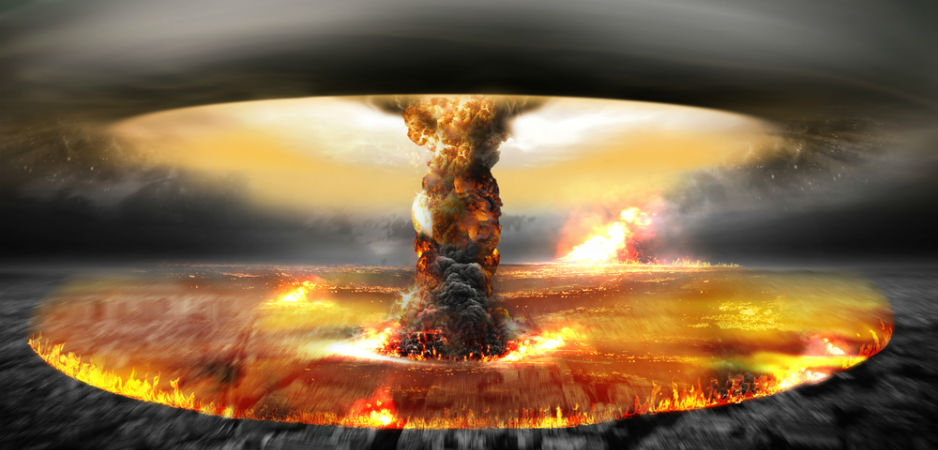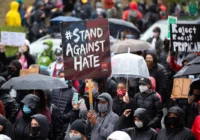Withering states with weakening writs, along with the rise of inequality and anger, imply that humanity has to prepare for the possibility of nuclear terrorism.
Terrorism is in the news a lot these days. Beautiful European capitals like Paris and Brussels have been attacked. Historic cities in the Middle East like Baghdad and Aleppo have suffered carnage. A splinter group from the Taliban struck Lahore in Pakistan, once home of the Mughals, at the end of March. Even idyllic places in Africa have not been spared.
Paul Ashley, a retired professional from the British Armed Forces, has mused that 2016 could be the year of terrorism. Many worry about a “dirty bomb” that might combine conventional explosives with radioactive material. Two of the bombers involved in the Brussels attacks appear to have monitored a senior researcher who worked at a Belgian nuclear center.
This week, US President Barack Obama hosted the Nuclear Security Summit and fretted about mad men getting “their hands on a nuclear bomb or nuclear material.” A 2014 report by the Nuclear Threat Initiative (NTI) estimated that “nearly 2,000 metric tons of weapons-usable nuclear materials remain spread across hundreds of sites around the globe.” The NTI report points out that some of these sites are poorly secured and that terrorists might have acquired the ability to build a bomb.
Obama focused on the Islamic State (IS) during his remarks to the summit. He pointed out that IS “continues to lose ground.” The organization is hemorrhaging men, material and money. Incessant pounding by airstrikes have decimated its oil infrastructure, slowing revenues to a trickle. Syrian troops have recaptured Palmyra, the stunning ancient city that IS damaged with fanatic ferocity. The so-called caliphate of the Islamic State is shrinking by the day, but the ideas it represents live on.
Attacks are taking place with disturbing regularity in different parts of the world. It is unlikely that IS operates a global command and control center coordinating attacks. What is definitely true is that many young Muslim men are inspired by this fanatical organization and are emulating its methods.
Disaffected young men who feel marginalized can often be harmless. However, once they feel extreme injustice and are exposed to toxic ideology, they can be deadly dangerous. Once these young men have a belief to live for and die for, they have few limits. This is not a new phenomenon. Maximilien Robespierre launched the Reign of Terror more than 200 years ago in the name of justice and virtue. He was in many ways the father of modern terrorism. By the second half of the 19th century, terror became a political tool for those who were fighting for justice, equality and political change. Rulers continued to resort to repression.
Terrorism increased in the 19th century because of severe political, social and economic strain. It is the same today. A scandal that has been breaking out at the time of writing this demonstrates how the rich and powerful use tax havens to launder money and evade tax. The global economic model is flailing if not failing. A debt crisis and a chronic lack of jobs are hobbling the economy. Inequality is increasing and social contracts are fraying.
There is real and palpable anger among people who feel cheated. In Europe, the far-right is gaining ground. In the United States, Ted Cruz of machine gun bacon fame is exuding machismo. Bailing out of banks resulted in wealth transfer from the poor to the rich. Quantitative easing has increased inequality exponentially. In poor countries, rigged privatizations, politically directed bank loans and crony capitalism have resulted in new societies of masters and slaves. In Afghanistan, Iraq and Syria, thousands of families are mourning their dead and aiming to slake their thirst for revenge.
This is an age of anger. Elites are discredited. They have been deemed to be avaricious, arrogant and asinine. Villains, old and new, are popping up. The lazy Arab, the dirty Jew, the African American welfare queen et al provide potent examples of this phenomenon. Such widespread anger can easily be directed into violence when fanatical faith or millenarian ideology comes into play.
At the same time, many states are withering. Obama’s summit involved more than 50 states but many of them are losing control. Pakistan is a classic example. Nawaz Sharif, the Pakistani prime minister, could not attend the summit because of the brutal attack on Easter Sunday in Lahore. At least 72 died and more than 200 were injured.
This violence is now endemic in the land of the pure. In 2013, Anwar Akhtar detailed how minorities have faced increasing discrimination and even persecution in Pakistan. Pakistan was founded by a Shia lawyer as a homeland for Indian Muslims who were supposed to comprise one nation. That theory was disproved when East Pakistan broke off to form Bangladesh in 1971. In a more recent ironic twist of fate, Shias are often gunned down in cold blood.
How did things in Pakistan come to such a pass? It all began innocuously enough. The Soviet Union invaded Afghanistan in 1979. The US decided to support the mujahidin, holy warriors, who were battling the Soviets. General Muhammad Zia-ul-Haq, the then dictator ruling Pakistan, signed up for the Afghan adventure. From now on, Saudi money started gushing through Pakistan.
Pakistan’s Inter-Services Intelligence (ISI) used this money to train the Taliban. The ISI also built a sprawling complex of madrassas, mosques, training camps, weapons warehouses and military bases. Today, there are approximately 24,000 madrassas that educate more than 2 million boys. Some of these boys end up joining jihadist groups that operate in Afghanistan and India. These groups now carry out operations in Pakistan as well. The fabled Pakistani deep state has created a Frankenstein it can no longer control.
As of March 2013, Pakistan had lost 49,000 lives in the so-called War on Terror. The violence continues unabated. As a result, the Pakistani state seems to be losing control. In 2014, Rafia Zakaria wrote a chilling article for Dawn, arguably Pakistan’s most famous English-language newspaper, on an increasingly repressive country, “equally unable to deliver freedom or justice.” She observed that Mumtaz Qadri was ruling as a prison king and acting as the arbiter of death sentences. He was ordering the murders of those suspected of blasphemy.
Qadri was no ordinary criminal. He killed Salmaan Taseer, the governor of Punjab, for defending a poor Christian woman in jail who had been accused of blasphemy. Qadri was finally hanged a little over a month ago, but more than 100,000 attended his funeral. Pakistan’s post-colonial state is being stretched to breaking point. Its incestuous scotch drinking elite runs a closed club. Social mobility in the country has fallen since independence in 1947 like Isaac Newton’s proverbial apple.
 Pakistanis have lost faith in their elites. Institutions no longer matter. Zahid Hussein, a noted Pakistani intellectual, quoted a general under Zia as saying that 25-30% of officers had Islamic fundamentalist leanings. Osama bin Laden spent his last days a stone’s throw from Pakistan’s mythic military academy. More pertinently, devout young Islamists are infiltrating the Pakistani state relentlessly. Hence, Pakistan’s nuclear material is at great risk of theft or misappropriation. Lest we forget, it was none other than Abdul Qadeer Khan passed on nuclear secrets to North Korea as well as Iran and Libya. Khan is the “father of the Islamic bomb” and a national hero in Pakistan.
Pakistanis have lost faith in their elites. Institutions no longer matter. Zahid Hussein, a noted Pakistani intellectual, quoted a general under Zia as saying that 25-30% of officers had Islamic fundamentalist leanings. Osama bin Laden spent his last days a stone’s throw from Pakistan’s mythic military academy. More pertinently, devout young Islamists are infiltrating the Pakistani state relentlessly. Hence, Pakistan’s nuclear material is at great risk of theft or misappropriation. Lest we forget, it was none other than Abdul Qadeer Khan passed on nuclear secrets to North Korea as well as Iran and Libya. Khan is the “father of the Islamic bomb” and a national hero in Pakistan.
As a state, India functions much better than Pakistan. Yet its nuclear material is not as safe as it seems. India’s military is in disarray, its intelligence is in shambles and the corruption of its bureaucracy is legendary. Its short-sighted elites care little for strategic matters and India’s nuclear material is not as safe as it seems.
North Korea makes India look good. Russia makes India look angelic. President Vladimir Putin did not even show up in Washington, DC. With the Pakistanis and the Russians not present, Obama’s summit did not quite have the oomph he desired.
The US itself is going through strange times. Donald Trump, the leading Republican candidate, has suggested that South Korea and Japan could do well to have nuclear deterrents of their own instead of rely on the US. This flies in the face of nonproliferation efforts by the US for decades and did not leave Obama too pleased. To add to his woes, the summit might be living on borrowed time because no US presidential candidate seems interested in keeping it going.
In his early career in the US Senate, Obama worked with Dick Lugar, a Republican senator, to get rid of weapons of mass destruction. States like Ukraine and Azerbaijan participated. Things have changed since. As stated earlier, many states are declining and their writs are weakening. At some point, some crazy group will acquire the knowledge, ability and material to make a dirty bomb. Of course, states have a duty to prevent the making and using of such a bomb, but at some point they will fail. When this happens, the best response for all decent good people around the world has to be to keep calm and carry on.
Sadly, a nuclear terrorist strike is not merely possible or probable. It is inevitable. It is time to start preparing for it.
*[You can receive “The World This Week” directly in your inbox by subscribing to our mailing list. Simply visit Fair Observer and enter your email address in the space provided. Meanwhile, please find below five of our finest articles for the week.]
The Question of Sovereignty in the EU Referendum
A vote to leave the European Union will be life-changing for the British people.
Whilst many issues are being discussed in relation to the forthcoming European Union (EU) referendum in the United Kingdom, the issue of “sovereignty” is the one that divides the remain and leave camps. The highly respected think tank Open Europe, which is backing neither side, has made it clear that the economic effects of the two options are marginal in this report. While there may be disruption in the short term, it is likely that the UK will prosper in either scenario.
The issue is thus about sovereignty and who calls the shots on important issues such as border control, environment, defense and security, all of which require government intervention. Trade is not an issue, as it is not governments who trade in either manufactured goods or in services. It is entrepreneurs and their businesses that generate the wealth that governments then spend wisely… Read more
Ignoring the Plight of the Rohingya is a Mistake
The State Department’s minimization of the plight of the Rohingya is sending dangerous, mixed messages to Myanmar and its neighbors.
The US State Department’s recent declaration of the Islamic State (IS) being responsible for genocide against groups in areas under its control, including Yazidis, Christians and Shia Muslims, captured headlines across the globe. The news came out of a congressionally mandated report.
However, the biggest story out of that report was not about IS, but rather the failure to find anything more than “discrimination” and “persecution” against the Rohingya in western Myanmar. Such a shockingly understated conclusion and downplaying of atrocities against Rohingya sends a dangerously mixed message at a time of important transition.
It is not so much that the State Department did not find that the Rohingya are facing genocide. Proving intent is always a difficult and controversial barrier for genocide determination. Rather, the greater damage is in the blatant minimization of the plight of the… Read more
Donald Trump is Foreign Policy’s Useful Idiot
It might take someone of Trump’s vapid visibility to drive home the point that “world’s policeman” is not a viable role for the US to play.
He wants to cut back on US military commitments overseas. He calls the Iraq War “one of the worst decisions ever made in the history of our country.” He promises to make deals with America’s adversaries. He’s comfortable with the détente with Cuba. And he really pisses off the stuffed shirts at The Washington Post. So, what’s not to like about Donald Trump?
Well, a great deal, of course. The man is an incoherent, misogynistic bully. But his foreign policy vision, a kind of fun-house version of Reaganism, is upsetting Beltway mandarins, shaking up the Republican Party, and pointing to a potential rupture in the informal liberal-conservative consensus on foreign policy that has prevailed in Washington since the end of the Cold War. It’s hard not to enjoy a frisson of schadenfreude… Read more
Don’t Overlook Obama’s Visit to Argentina
Argentina is the only major player in Latin America with a forward looking agenda that offers hope to its people.
In the crush of events that always weigh down a US president, and the daily eruptions of the 2016 election campaign, it would be a monumental mistake to underestimate the importance of President Barack Obama’s recent meeting with newly elected Argentine President Mauricio Macri. US outreach to Latin America never seems to garner sufficient priority, and the personal attention by Obama to one of the most interesting new leaders in a hugely influential country south of the border should not go unremarked.
Macri’s electoral victory in 2015 represents a long awaited change from the path taken by many of Argentina’s neighbors, where corruption and ineptitude seem pervasive in places like Venezuela, Bolivia and Brazil. Succeeding Cristina Fernández de Kirchner, whose fame, or infamy, rested on her accommodations with neighborhood thugs—not to mention her various deals with Iran’s… Read more
What Does the Economy Need to Recover?
After the global financial crisis of 2008, a change in the economic paradigm is needed to avoid future downturns.
In economic theory, “one person’s spending is another person’s income,” which drives aggregate demand in the economy. Often, this cycle breaks due to flawed economic policymaking that ends in economic crisis. The global economy has always been susceptible to financial upheavals that have brought economic hardship. Although a global crisis creates impediments for the economy to grow, at the same time it requires a change in the economic paradigm.
Despite of what we have learned from the most recent economic crises, the world is still in recession. The global economy’s recovery pattern is fragile. Financial flows and excessive debt have dominated many economies since 2009, and there is a prevalence of a volatile and decelerating global gross domestic product (GDP) growth rate. Brazil, Japan and half of Europe are already moving in the recessionary phase. The reason why the… Read more
The views expressed in this article are the author’s own and do not necessarily reflect Fair Observer’s editorial policy.
Photo Credit: Razvan Ionut Dragomirescu / Shutterstock.com
 We bring you perspectives from around the world. Help us to inform and educate. Your donation is tax-deductible. Join over 400 people to become a donor or you could choose to be a sponsor.
We bring you perspectives from around the world. Help us to inform and educate. Your donation is tax-deductible. Join over 400 people to become a donor or you could choose to be a sponsor.
Support Fair Observer
We rely on your support for our independence, diversity and quality.
For more than 10 years, Fair Observer has been free, fair and independent. No billionaire owns us, no advertisers control us. We are a reader-supported nonprofit. Unlike many other publications, we keep our content free for readers regardless of where they live or whether they can afford to pay. We have no paywalls and no ads.
In the post-truth era of fake news, echo chambers and filter bubbles, we publish a plurality of perspectives from around the world. Anyone can publish with us, but everyone goes through a rigorous editorial process. So, you get fact-checked, well-reasoned content instead of noise.
We publish 2,500+ voices from 90+ countries. We also conduct education and training programs
on subjects ranging from digital media and journalism to writing and critical thinking. This
doesn’t come cheap. Servers, editors, trainers and web developers cost
money.
Please consider supporting us on a regular basis as a recurring donor or a
sustaining member.
Will you support FO’s journalism?
We rely on your support for our independence, diversity and quality.











